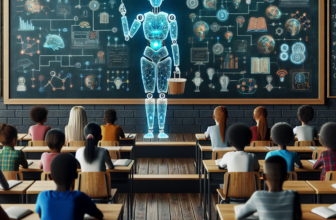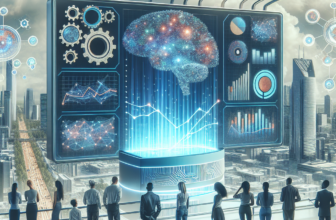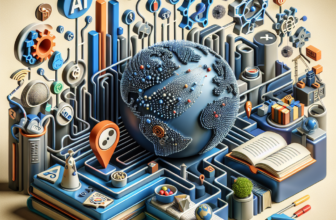Revolutionizing the Voice Industry: AI Voice Generators at the Forefront of Innovation

Revolutionizing the Voice Industry: AI Voice Generators at the Forefront of Innovation
In recent years, the voice industry has witnessed a major revolution with the advent of AI voice generators. These advanced technologies have completely transformed the way we interact with voice assistants, virtual agents, and even audiobooks. The ability to create human-like voices with exceptional clarity and emotion has opened up endless possibilities for industries such as entertainment, marketing, and customer service. Let’s explore the potential of AI voice generators and how they are revolutionizing the voice industry.
AI voice generators, as the name suggests, are powered by artificial intelligence algorithms that can convert text into natural human-like speech. This groundbreaking technology has significantly enhanced the user experience by enabling more engaging and authentic interactions. With AI voice generators, creators can easily transform written content into spoken words, giving it a personal touch and a human-like feel. Whether it’s creating voiceovers for videos, generating narrations for e-learning courses, or developing conversational AI, these tools have streamlined the voice production process, making it faster, more accessible, and less expensive.
The AI voice generation technology has also played a vital role in the development of virtual agents and voice assistants. Companies are now able to develop virtual personalities that not only understand speech but also respond with lifelike voices, enhancing the overall user experience. Whether it’s a virtual assistant guiding users through a website or an AI-powered customer service agent resolving queries, the natural-sounding voices generated by AI voice generators make the interaction more intuitive and dynamic.
One of the key advancements in AI voice generation is the ability to generate expressive and emotionally nuanced voices. These generators can add inflections, emphasize certain words, and even mimic accents to create a more engaging and believable experience. For instance, a character in a video game can now convey anger, joy, or sadness through their voice, bringing a whole new level of immersion and realism to the gaming experience. The emotional aspect of AI voice generators makes them an invaluable tool for content creators across various industries, not just limited to storytelling and entertainment.
Additionally, AI voice generators offer multilingual capabilities that can bridge language barriers and enable communication on a global scale. These tools have the ability to translate text into different languages and generate voice outputs in each respective language. By doing so, businesses can effectively reach audiences worldwide with personalized content in their native language. This localization feature gives companies a competitive edge, allowing them to establish a meaningful connection with customers from different cultural backgrounds.
While AI voice generators have undoubtedly revolutionized the voice industry, they still come with some challenges and limitations. To help you gain a better understanding, we have compiled a list of frequently asked questions about AI voice generators:
Q: How do AI voice generators work?
A: AI voice generators employ deep learning algorithms to analyze and understand phonetics, intonations, and nuances of human speech. These models are then trained on massive datasets to generate natural-sounding voices.
Q: Can AI-generated voices replace human voice actors?
A: While AI-generated voices have come a long way, they still lack the creativity, flexibility, and improvisation that human voice actors bring to the table. However, AI voice generators are a valuable tool for automating repetitive tasks and creating a large volume of voice content quickly.
Q: Are AI-generated voices indistinguishable from human voices?
A: AI-generated voices have made significant strides in sounding human-like, but they are not indistinguishable. However, advancements in technology are constantly pushing the boundaries, and we can expect even more lifelike voices in the future.
Q: Are there ethical concerns surrounding AI voice generators?
A: Yes, there are ethical concerns surrounding the potential misuse of AI voice generators, such as deepfakes and impersonation. It is crucial for developers and users to follow strict guidelines and regulations to ensure responsible use.
In conclusion, AI voice generators are revolutionizing the voice industry by enabling the creation of human-like voices with exceptional clarity and emotion. These technologies have transformed the way we interact with voice assistants, virtual agents, and multimedia content. With their ability to generate expressive voices in multiple languages, AI voice generators have empowered businesses to reach a global audience. However, despite their advancements, they come with limitations, and responsible use is essential to address ethical concerns. Nevertheless, there is no denying that AI voice generators are at the forefront of innovation, paving the way for a future where the boundaries between human and machine-generated voices continue to blur.
Revolutionizing the Voice Industry: AI Voice Generators at the Forefront of Innovation
In recent years, the voice industry has witnessed a major revolution with the advent of AI voice generators. These advanced technologies have completely transformed the way we interact with voice assistants, virtual agents, and even audiobooks. The ability to create human-like voices with exceptional clarity and emotion has opened up endless possibilities for industries such as entertainment, marketing, and customer service. Let’s explore the potential of AI voice generators and how they are revolutionizing the voice industry.
…
…
FAQs
Q: How do AI voice generators work?
A: AI voice generators employ deep learning algorithms to analyze and understand phonetics, intonations, and nuances of human speech. These models are then trained on massive datasets to generate natural-sounding voices.
Q: Can AI-generated voices replace human voice actors?
A: While AI-generated voices have come a long way, they still lack the creativity, flexibility, and improvisation that human voice actors bring to the table. However, AI voice generators are a valuable tool for automating repetitive tasks and creating a large volume of voice content quickly.
Q: Are AI-generated voices indistinguishable from human voices?
A: AI-generated voices have made significant strides in sounding human-like, but they are not indistinguishable. However, advancements in technology are constantly pushing the boundaries, and we can expect even more lifelike voices in the future.
Q: Are there ethical concerns surrounding AI voice generators?
A: Yes, there are ethical concerns surrounding the potential misuse of AI voice generators, such as deepfakes and impersonation. It is crucial for developers and users to follow strict guidelines and regulations to ensure responsible use.







